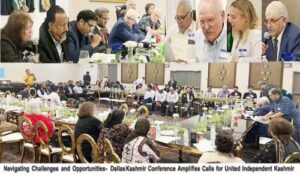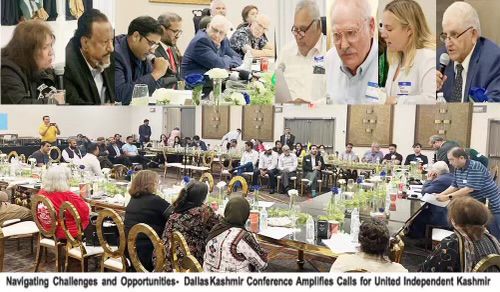
By: Raja Zahid A Khanzada
Dallas: A significant conference addressing the complexities of the Kashmir issue was held at a local hotel in Dallas, bringing together lawmakers, policymakers, scholars, and activists to discuss the path toward peace and development in the region.
Titled “Kashmir: Navigating Challenges and Opportunities, and the Cost of Conflict on Women,” the event featured speeches from prominent diplomats, human rights advocates, and economic experts. The speakers emphasized Kashmir’s historical struggle for independence and the urgent demand for the right to self-determination.
Raja Muzaffar, Acting Chairman of JKLF and Director of South Asia Democracy Watch, opened the conference with a powerful keynote address. He stressed the need for a unified voice advocating for Kashmir’s independence, emphasizing the importance of dialogue and collaboration. Muzaffar also thanked the attendees and organizers for their commitment to making the event a success.
Key speakers included Texas State Representative Terry Meza, JKLF AJKGB Zone President Dr. Toqeer Gilani, Dallas Peace and Justice Center President Bill Maxwell, JKLF North America President Sardar Haleem Khan, and others. They highlighted the ongoing denial of the right to self-determination for the people of Jammu and Kashmir and condemned the arbitrary detentions, torture, and human rights abuses that have become widespread.
The conference called for the release of Kashmiri leader Muhammad Yasin Malik and urged India and Pakistan to end oppressive state practices, including illegal detentions and enforced disappearances. The speakers emphasized the need for meaningful, results-oriented dialogue between representatives of the international community, India, Pakistan, and the people of Jammu and Kashmir.
Learning from the past 77 years, the speakers suggested that the withdrawal of forces from both sides of the ceasefire line could pave the way for peace. This would be followed by eliminating the ceasefire line, allowing free movement and family reunification. They argued that easing military tensions would create a conducive environment for the people of Jammu and Kashmir to choose their own political future.
The conference concluded that an independent, secular, and democratic Jammu and Kashmir state would serve as a bridge for peace in the region. Such a state would address the aspirations of its diverse population without external interference, fostering cooperation between India, Pakistan, and Kashmir for regional stability and prosperity.



